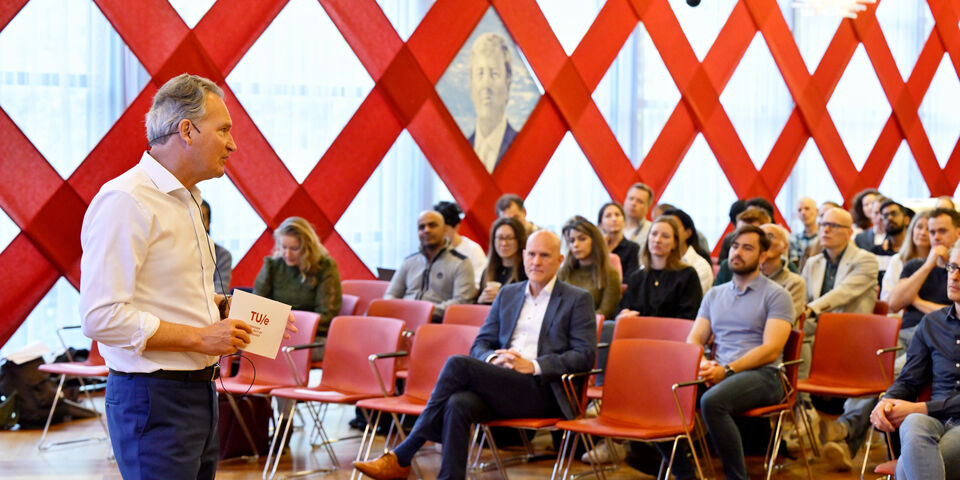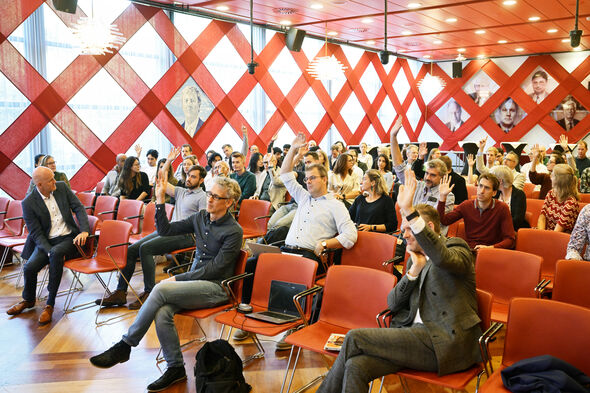Open science at TU/e requires a joint effort
Almost everyone is aware of the importance of transparency in scientific research, of making research results accessible, and of sharing data. “Open Science is here to stay, and each of us is responsible for making this a reality,” said Executive Board President Robert-Jan Smits in his speech at the open science event that took place in the Auditorium last Tuesday.
While the entire country was watching how its political leaders, dressed up for the occasion, presented the financial plan for the upcoming year, about a hundred TU/e staff and students gathered in the Senaatszaal of the Auditorium to learn more about open science. The event, entitled ‘Everything you wanted to know about Open Science at TU/e’, aimed to create more awareness and involvement with regard to open science within the TU/e community. The principles resonated with most of those present, but to put them into practice, many obstacles still need to be overcome, the event revealed.
System change
The program gets underway with a welcome speech by Executive Board President Robert-Jan Smits. In his earlier role at the European Commission, where one of the things he concerned himself with was the Horizon 2020 funding program, Smits was perfectly placed to witness the increasing necessity for a transition to a completely new approach to science.
The most important reasons for this included the exponential growth of data, the growing scientific community – in which countries like China are increasingly playing a role – and more international collaboration. This, in combination with increasing societal demand for more transparency, requires a radical system change according to Smits. Open science would have a lot of advantages, such as a faster exchange of knowledge, more efficient use of public funds, less scientific misconduct, and more money for scientific research.
Recognition and Rewards
Open science is about much more than open access and sharing data, Smits emphasizes. For one thing, it also constitutes a new perspective on the Recognition and Rewards system. Traditionally, academic recognition is strongly determined by publications in renowned journals. In an open science framework, the focus would shift to broader types of impact, such as the extent to which data or research methods are reused, collaboration with non-academic partners, and social relevance. This would also create new ways of rewarding scientists.
According to Smits, the Netherlands is a European frontrunner when it comes to open science. “It’s high on the national agenda,” he says. At the same time, he regrets the announced cutbacks in education, which will inevitably also affect open science initiatives. “We are happy with Beethoven (the financial support from the government for the technological sector in the Brainport region, 450 million euros of which is going to education, ed.), but the planned cutbacks are simply bad news.”
What, why, and how
Hans de Jonge, Director of Open Science NL – a steering body for promoting open science in the Netherlands – then talks more about what open science is exactly, why it’s so important to head in that direction, and what the goals of Open Science NL are. It quickly becomes obvious that open science is an umbrella term for many different practices, all with the aim of making science accessible to everyone and thereby serving society at large in the best possible way.
As the ‘what’ and ‘why’ seem fairly obvious, it’s the ‘how’ that deserves extra attention. De Jonge demonstrates what is required to realize the transition to open science, from providing researchers with the necessary technical (and other) support to drafting clear guidelines. The budget that the body receives from the government to this end is used, among other things, to invest in the construction of digital infrastructure, set up a national training platform, and connect the community by way of different activities, De Jonge says.
Open and FAIR
The first breakout session delves deeper into a number of concepts relevant to open science, such as the difference between open and FAIR data. “Open data simply means you disclose your data so others can use it,” session leader Nami Sunami explains. FAIR stands for the four principles that data must comply with: Findable, Accessible, Interoperable, and Reusable. The participants learn that not all open data is FAIR, and that – conversely – not all FAIR data is open, for example because it’s behind a paywall. According to the principles of open science, the goal is to make as much of the data as possible both open and FAIR. These two concepts combine to maximize the impact and accessibility of scientific data.
Although it’s increasingly clear to them what open science involves, many of those present struggle a bit with picturing their individual contribution. A digital form is used to ask them to answer different questions about open science, after which the answers are shown on the big screen. ‘What are your challenges when it comes to making your data open and FAIR?’ is one of the questions. Participants’ answers vary: they feel like they’re not clear on what exactly is expected from them, don’t possess the required knowledge, or simply lack the time.
When asked what support they need to make their data open and FAIR, the most frequent answers are tools, training, information provision, time, and budget. Some participants also voice concerns about what will happen with the shared data, and indicate they have misgivings about the confidentiality of certain data.
“It’s about more than yourself”
At the end, the participants have to give a score of 1 to 5 for the importance they assign to open and FAIR data. “It’s important to share data and collaborate, but it has to be feasible,” one of them says to explain their score: a 2. “There is so much data, so then the question is: do you have to share all of it? You have to look at what makes sense, and not just share for the sake of sharing.”
Smits asks for the microphone to respond to this. “Personal opinions aside, we all have a responsibility to society in this area. By sharing data, we can work more efficiently and make better use of public money. It’s about more than yourself,” he argues. The transition to open science requires a change within the organization and a joint effort, he believes. “Think about it and look at what you can do yourself to make it a reality,” is his closing invitation to the participants.
To support researchers in managing their data, a new tool was launched: the Research Cockpit. Using this centralized platform, researchers can ask for help and access tools to manage their research data efficiently.
Anyone who has questions relating to the management or sharing of research data can also contact the data stewards of TU/e Research Data Management, which is part of LIS. Each department has a dedicated data steward that helps researchers deal with issues involving data management. You can email any questions you have on the matter to .




Discussion